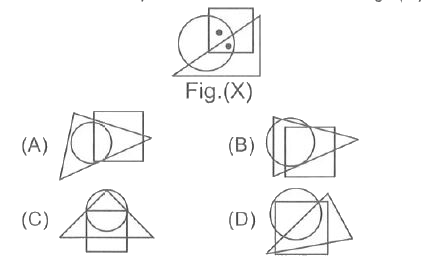Two rows of numbers are given. The resultant number in each row is to be worked out separately based on the following rules and the question below the rows of numbers is to be answered. The operations on numbers progress from left to right. Rules:
(i) If an odd number is followed by another composite odd number, they are to be multiplied.
(ii) If an even number is followed by an odd number, they are to be added.
(iii) If an even number is followed by a number which is a perfect square, then even number is to be subtracted from the perfect square.
(iv) If an odd number is followed by a prime odd number, the first number is to be divided by the second number
(v) If an odd number is followed by an even number, the second one is to be subtracted from the first one.
101551411p
If p is the resultant of the first row, what will be the resultant of the second row?
6
81
5
24
The correct Answer is:C
Step by step video, text & image solution for Two rows of numbers are given. The resultant number in each row is to be worked out separately based on the following rules and the question below the rows of numbers is to be answered. The operations on numbers progress from left to right. Rules: (i) If an odd number is followed by another composite odd number, they are to be multiplied. (ii) If an even number is followed by an odd number, they are to be added. (iii) If an even number is followed by a number which is a perfect square, then even number is to be subtracted from the perfect square. (iv) If an odd number is followed by a prime odd number, the first number is to be divided by the second number (v) If an odd number is followed by an even number, the second one is to be subtracted from the first one. {:(10,15,5),(14,11,p):} If p is the resultant of the first row, what will be the resultant of the second row? by Reasoning experts to help you in doubts & scoring excellent marks in Class 10 exams.
Topper's Solved these Questions
Similar Questions
Which of the following options satisfies the same conditions of placement of dots as in Fig. (x)?
 08:28View Solution
08:28View SolutionRead the given statements and select the correct option.
Statement 1: For a given time interval, average velocity has single value while average speed can have many values.
Statement 2: Velocity is the speed of an object moving in a definite direction.05:23View SolutionL स्वप्रेरण गुणांक का प्रेरक तथा R प्रतिरोध वाले बल्ब को प्रत्यावर्ती धारा स्त्रोत के साथ श्रेणीक्रम में जोड़ा जाता हैं परिपथ की प्रतिबाधा का सूत्र लिखिए । बल्ब की चमक पर क्या पड़ेगा , यदि -
(i ) प्रेरक में फेरो की संख्या घटा दी जाये ?
(ii ) लोहे की छड़ प्रेरक कुण्डली में प्रवेश कराई जाये ?03:46View Solutionएक कक्षा के छात्रों को पंक्ति में खड़ा किया जाता है। यदि प्रत्येक पंक्ति में 4 अतिरिक्त छात्र होते तो 2 पंक्ति कम प्रत्येक पंक्ति में 4 छात्र कम होते तो 4 पंव्ति ज्यादा होती है। कक्षा में छात्रों की संख्या ज्ञात कीजिए।
02:24View Solutionतीन अका की एक संख्या के अंकों का योग 17 है। मध्य का अंक शेष दो अंकों के योग से 1 अधिक है। यदि अक परस्र बदल दिये जाए तो संख्या 396 कम हो जाती है। संख्या ज्ञात कोजिए।
02:19View Solutionसमस्याओ में रेखिक समीकरण युग्म बनाइए और उनके हल प्रतिस्थापन विधि द्वारा ज्ञात कीजिए :
दो सख्याओ का अन्तर 26 है और एक सख्या दूसरी सख्या की तीन गुनी है उन्हे ज्ञात कीजिए।06:47View Solutionसमस्याओ में रेखिक समीकरणों के युग्म बनाइए और उनके हल (यदि उनका अस्तित्व हो ) विलोपन विधि से ज्ञात कीजिए :
दो अको की सख्या के अको का योग 9 है । इस सख्या का नौ गुना , सख्या के अको को पलटने से बनी सख्या का दो गुना है । वह सख्या ज्ञात कीजिए ।01:44View Solutionएक के विद्यार्थियों क्रो पंकितियों में खड़ा होना है। यदि पक्ति में 3 विधर्थी अधिक होते, तो 1 पक्ति कम होती । यदि पक्ति में 3 विधार्थी कम होने , तो 2 पंक्तिया अधिक बतनी ।कक्षा में विद्यार्थियों की संख्या ज्ञात कीजिए।
06:06View Solutionदो सख्याओ का योग 35 और इनका अन्तर 13 है । सख्याए ज्ञात कीजिए ।
04:17View Solutionदो पाँसे एक साथ उछाले जाते हैं। प्रायिकता ज्ञात कीजिए, जबकि ऊपर पड़ने वाली संख्याओं का योगफल
(i) एक सम संख्या हो, जो 8 से अधिक हो,
(ii) 3 का गुणज हो, जोकि 9 से अधिक न हो।02:51View Solutionयदि 10 टिकटों पर 1 से 10 तक की (प्रत्येक पर एक) संख्यायें लिखी हुई हैं। कोई संख्या दोहराई नहीं गई है। यदि A एक ऐसी घटना है, जिसमें विषम संख्यायें हों और B एक ऐसी घटना हो, जिसमें 3 से विभाज्य संख्या हों, तो दिखाओ कि P(A∪B)=P(A)+P(B)−P(A∪B)
02:04View Solutionएक पासा फेंका जाता है। मान लीजिए घटना E ‘पासे पर संख्या 4 दर्शाता है और घटना F 'पासे पर सम संख्या दर्शाता है। क्या E और F परस्पर अपवर्जी हैं ?
03:03View Solutionएक आयनिक क्रिस्टल A+B− के लिए उपसहसंयोजी संख्या 6 है । त्रिज्या अनुपात का मान होगा :
01:42View Solution100 g fcc क्रिस्टल जिसका घनत्व d=10g/cm3 है तथा कोर 100 pm के बराबर है, में परमाणुओं की संख्या होगी :
04:14View Solutionयदि त्रिज्या अनुपात की परास 0.414 - 0.732 है, तो समन्वय संख्या होगी :
02:16View Solutionपरासरण दाब विलेय की संख्या के समानुपाती होता है.
02:04View Solution

